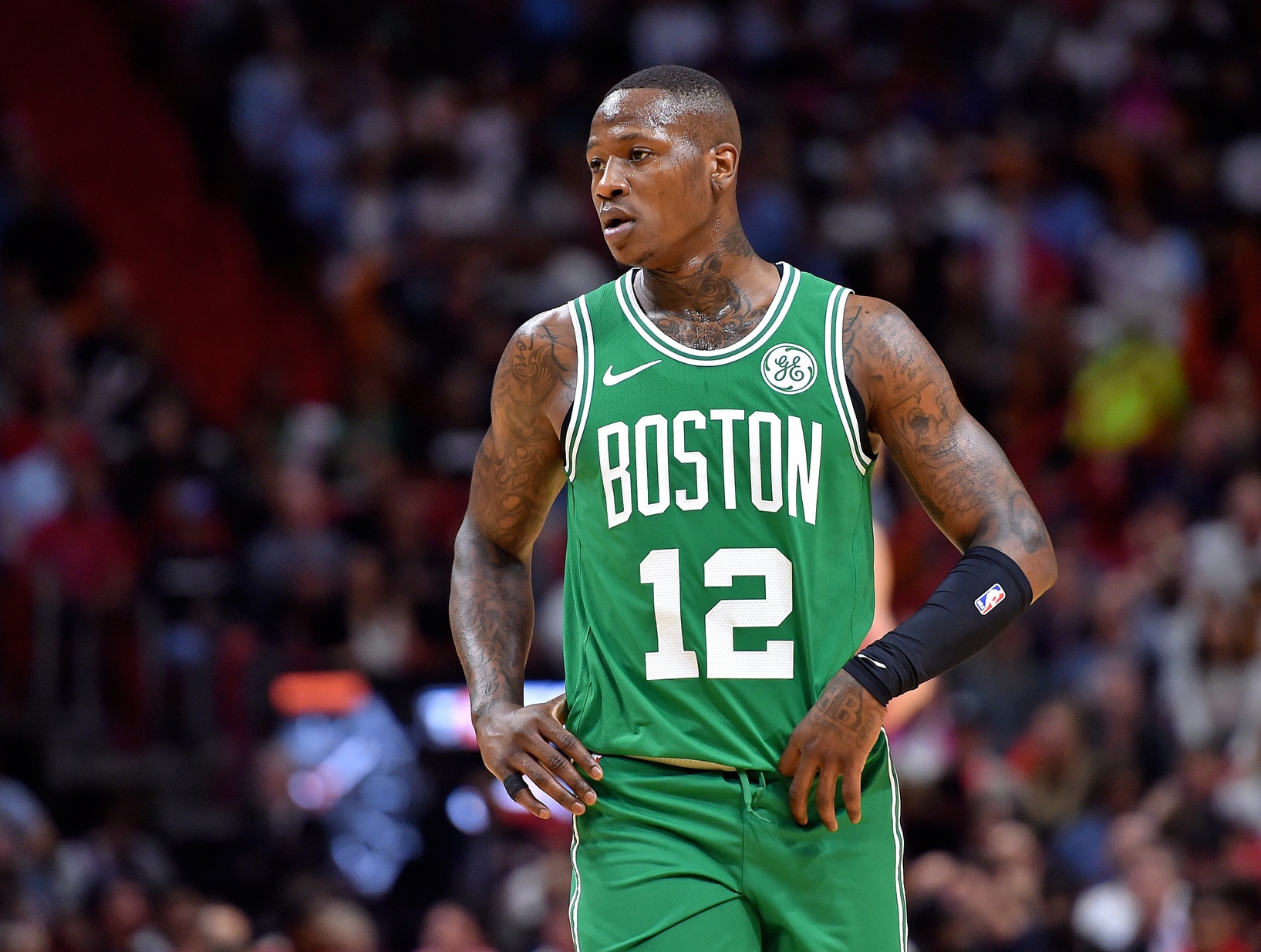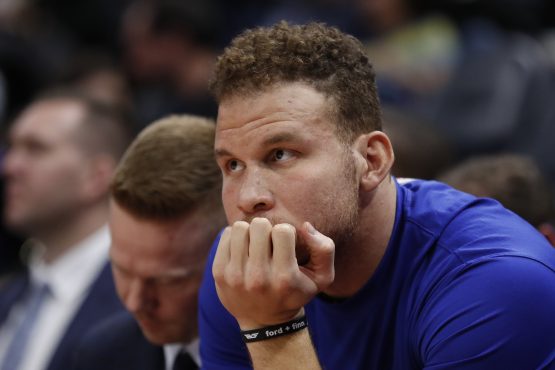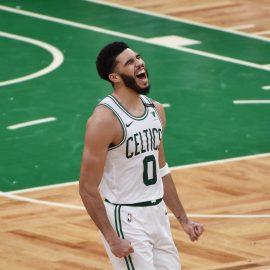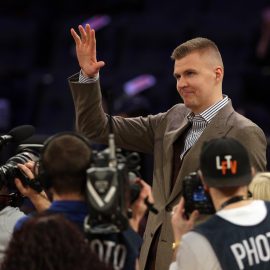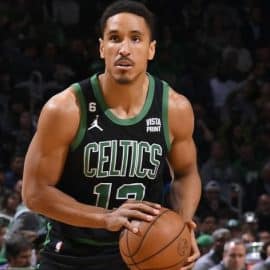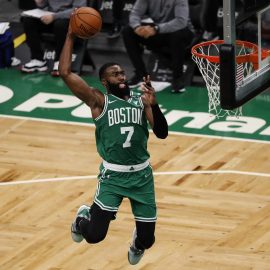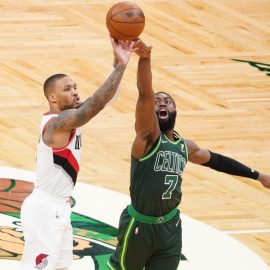Every morning, we compile the links of the day and dump them here… highlighting the big storyline. Because there’s nothing quite as satisfying as a good morning dump.
The interesting thing from the Celtics’ perspective is that Irving is seen as something of a package deal with Anthony Davis. If Irving stays, the Celtics could shoot up to the top of the Davis sweepstakes in New Orleans due to their appealing collection of young talent and draft assets. The Celtics might be more willing to part with their prized youngsters if they can flaunt an Irving-Davis partnership and rule the East.
That’s Tom Haberstroh with a decidedly conventional take on the Celtics’ off-season priorities.
First off, I think it’s hardly a given that an Irving-Davis partnership would ‘rule the East.’ Depending on the assets that New Orleans would expect from Boston, the Celtics might not be appreciably better with Davis.
One could argue that the Celtics have too much talent and too few minutes, and that there would be ‘addition by subtraction’ if the team had to include multiple rotation players in a deal for Davis. However, it’s unlikely that the players that the Celtics would have to part with for Davis would improve the rotation.
Lets take the wing position for example–the Celtics have Hayward, Morris, Brown and Tatum. From the Celtics’ standpoint, the one guy they would be most willing to part with–Morris–is the one player that the Pelicans would have the least interest in. Add in the fact that the Pelicans would likely require both Brown and Tatum, and a position that was perhaps too deep is suddenly rather shallow: The team only has Hayward and 2019 free agent Marcus Morris.
Having taken Haberstroh to task for trotting out a hackneyed view of the Celtics’ interest in the Anthony Davis sweepstakes, I think he makes a very important point elsewhere in the article:
Danny Ainge is not one to prioritize emotional sentiment over cold rationality. Ask Isaiah Thomas. If Ainge feels like the team is better off without Kyrie Irving, they’ll have a Plan B in place to move on from the All-Star, should Irving leave as a free agent this summer.
Irving hasn’t been the most galvanizing leader. Some outsiders believe that his lukewarm approval rating in the locker room might give the Celtics some pause before handing over a long-term max deal. Said one league executive of Irving: “You’re offering that guy back on a humongous deal? That’ll be interesting to see.”
The notion that the Celtics would let Kyrie Irving walk is an interesting one–and one that would undoubtedly please a few of the team’s crankier fans. Frankly, I don’t think that’s the direction that the Celtics will take if they have a disappointing post-season run. Kyrie is a 24 carat, steel belted, proven, demonstrated, when-the-chips-are-down, when-it’s-all-on-the-line guy. You might win a championship without a guy like Kyrie–but you’ll never be a dynasty.
If Kyrie’s instincts as a regular season team-leader aren’t the best, I’d expect the Celtics to pursue some unconventional angle to lighten that load on Irving. Maybe they make Marcus Smart the team captain? I don’t know. All I know is that if being a team leader isn’t part of the Kyrie Irving skill set, the team likely values enough of his other skills that they’ll work around that shortcoming.
However, if the Celtics disappoint in this playoff run, it’s hard to imagine that there won’t be changes.
Ainge blew up a team that unexpectedly made the ECF in 2017 because he (rightly, in my perspective) knew that team could not win a championship. The team he put together for the long haul, however, has been an almost unqualified disappointment. If they figure something out in the playoffs, then great. If they don’t, well, I don’t think the team is going to go all-in on Davis, but they could very well let Rozier walk and trade a smaller portion of their assets for a more experienced starter.
On the other hand, if the Celtics’ postseason is as frustrating as the regular season has been, the whole league will likely be expecting Ainge to make a move, thus making it rather difficult for a guy whose best moves have been wholly unexpected to maneuver. If everyone expects Ainge to blow up this team, he may end up standing pat, simply because that’s preferable to trading away players and getting less in return than he would have obtained if he had more leverage.
I hope the Celtics’ disappointing play stops when the regular season ends. But at the same time, this is a very young team, and as the full saying goes:
Experience is the best teacher, for the fool who will know no other
One way or another, this team needs to learn some hard lessons. Ideally, it won’t require getting bounced in the first or second round, but if that’s how they have to learn, well, I guess that’s how they’ll have to learn.
Page 2: Where Danny doesn’t regret the Perk trade
“I second-guess things, but that’s not one of them,” he said. “And here’s why: Perkins was hurt. People keep forgetting that. Perkins had a torn ACL. He wasn’t healthy, he wanted a contract extension, (and) we were not going to pay him the money just because of the payroll we had.
“And after we traded him, he ended up getting surgery again. So, he wasn’t going to help us then. Nenad Kristic was actually better than Perk at that moment in time because of his health, but then he got hurt.”
Ainge makes a fair point: Perkins was never the same after tearing his ACL in Game 6 of the 2010 NBA Finals, and his production dipped further in Oklahoma City from 10.1 points per game in Boston to 5.1 points per game the following season. The C’s also couldn’t have foreseen Green’s heart issues.
Earlier, on Tuesday, I got my chronology wrong–the playoff series in which Dwyane Wade wrecked Rondo’s elbow happened in 2011, not 2012, when the Heat went on to lose to the Dallas Mavericks.
We tend to forget how well the Celtics played without Perk in that 2011 season. The Celtics were 33-10 before Perk suited up for the first time.
The team finished the season 56-26, and swept the Knicks out of the first round.
In the cliched ‘Perk was a glue guy and the Celtics were the Big Three’ take, Ainge sabotaged the team’s chance at winning titles in both 2011 and 2012 by trading Perk.
The reality is, in my opinion, rather different.
As with the 80s ‘Big Three’, talk of this most recent ‘Big Three’ overlooks just how important the point guards on both teams were. Talking about “Bird, Parish and McHale” without mentioning DJ is playing false to history, and ignoring just how essential Rondo was to the team’s success in 2010-2012 in order to yammer on about “Pierce, Garnett and Allen” is similarly dishonest.
The Celtics’ 2011 team went in the crapper in the second round of the playoffs, when Wade decided that, since he was falling down anyway, he might as well grab the closest Celtic player and take him down with him.
And in 2012? Well, one of the reasons the Celtics traded for Jeff Green was because the team had zero bench scoring–and if you look at the last few games of the 2012 ECF, you’ll notice that the team had almost no bench scoring, as a then much younger Heat team simply wore out the Celtics’ starters. A healthy Jeff Green (or a healthy Avery Bradley) contributing from the bench makes that series look very very different.
A healthy Kendrick Perkins clogging the middle does nothing to help the Celtics beat the Heat in either 2011 or 2012. Undo the Perk trade, and you get the same results in both seasons: The Celtics lose to the Heat in 2011 because Rondo’s hobbled and in 2012 because they have no bench scoring.
The rest of the links:
MassLive: Danny Ainge does not regret the Kendrick Perkins trade: ‘We were not going to pay him’ | Boston Celtics’ NBA 2K team CLTX Gaming enters league’s second season with renewed chemistry
NBC Sports: Stevens an expert in playoff ball in Indiana
Add The Sports Daily to your Google News Feed!
